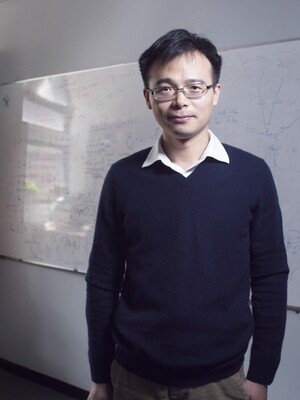 | Dr Shizhong ZHANG Associate Professor of Department of Physics
|
Q: What do you think are your most significant research accomplishments, and what has been the impact of your research?
A: My most important research accomplishment has been on the establishment and elucidation of universal relations in strongly interacting unitary Fermi gas and their implication for various transport properties of the system. This set of universal relations are due to a special feature of the dilute atomic system for which the actual range of interaction is much smaller than the average inter-particle distance, thus allowing an exact treatment within a binary collision approach. Many experiments have been conducted, first to test the validity of these relations, and later its consequences, for example on their implications in bulk viscosity.
These universal relations centre around a concept called contact, and have become a main topic of research in dilute quantum gases with many applications. For example, We showed that in the case of transverse spin diffusion, the contact dynamics (two-body quantity) is intimately connected with spin dynamics (one-body quantity) and we derive bounds for their time constants observed in the experiments. In the case of investigating the bulk viscosity of the system, it again occupies center stage as it measures the breaking of scaling invariance in the system.
Q: Please give a brief description of 1 - 2 ongoing research projects that best reflect your visions in the scientific field.
A: My current research project focuses on the transport properties of strongly interacting systems which in fact has been my interest for a long time. For example, we are now investigating the dynamics of a strongly interacting Fermi gas in one-dimensional geometry. There are a lot of physical realisations of these one-dimensional system, such as those appearing on the edge of the quantum Hall bar, or cold atoms confined in one-dimensional optical trap. The main reason that these systems interest me is that in the presence of strong interaction, the simple approach based on single particle physics is grossly inadequate. In one dimension, it is possibly the simplest setting where the effects of interaction are most prominent, and the likelihood of clean theoretical calculation most probable. The downside is that the insight one gains may be less relevant to physics in three dimensions, which is what one would most want to know.
I feel that the most theoretically challenging problem in many-body physics in general, and in cold atom in particular, is the understanding of dynamics and transport in cases where strong interaction renders the usual description, in terms of Boltzmann equation, inadequate.
Q: What is the most important question you want to address?
A: The most important question to me is the understanding of collective behaviour of a many-body system when strong interaction is present. This is a general question that has applications in many areas of modern condensed matter and atomic/molecular physics. In my narrow area of expertise, I would like to tackle this question in the context of strongly interacting Fermi gas where experiments can be readily carried out. Specifically, I want to understand how to reliably compute various transport coefficients such as charge/thermal conductivity in the resonant limit of the atomic gas and if necessary, develop new techniques and frameworks for those questions.
Q: Where do you see yourself in five years/ ten years? What do you want to accomplish the most?
A: The first part of the question is a bit hard to answer. I guess intellectually, I would have liked to be able to make visible progresses along the research lines described above. It is a challenging topic and a lot depends on being able to look at the problem from various different angles. For that, there is a lot to learn and to try.
The most important goal for me to accomplish in the next few years would be to understand in full detail some of the techniques and results that we are now investigating related to one-dimensional systems. It is a rich subject with a lot of background materials. Various different angles can be taken in that particular field and I believe it would be exciting to see and participate in how it develops.
Q: Who has influenced you the most?
A: Obviously my Ph.D advisor, Professor Anthony LEGGETT, has had a lasting influence on my taste and as a result, the choice of problems in my research.
Q: How would you go about motivating yourself when you are going through a low point?
A: I feel that in any theoretical research, it is a given that even though one might have a hunch as to how things will turn out, in reality, after sweat and tears, it might just turn out to be flat wrong. In fact, we recently had such incident. But I believe that not all is lost. It is just part of the process where one gains new and deeper understanding of the subject.
Q: Can you tell us more about your research group? What are the roles and the missions?
A: Currently, I have one graduate student and two postdoctoral fellows working actively with me. As collaborators in most of each other’s endeavours, we often go through details of calculations together. I learn a lot from them.

